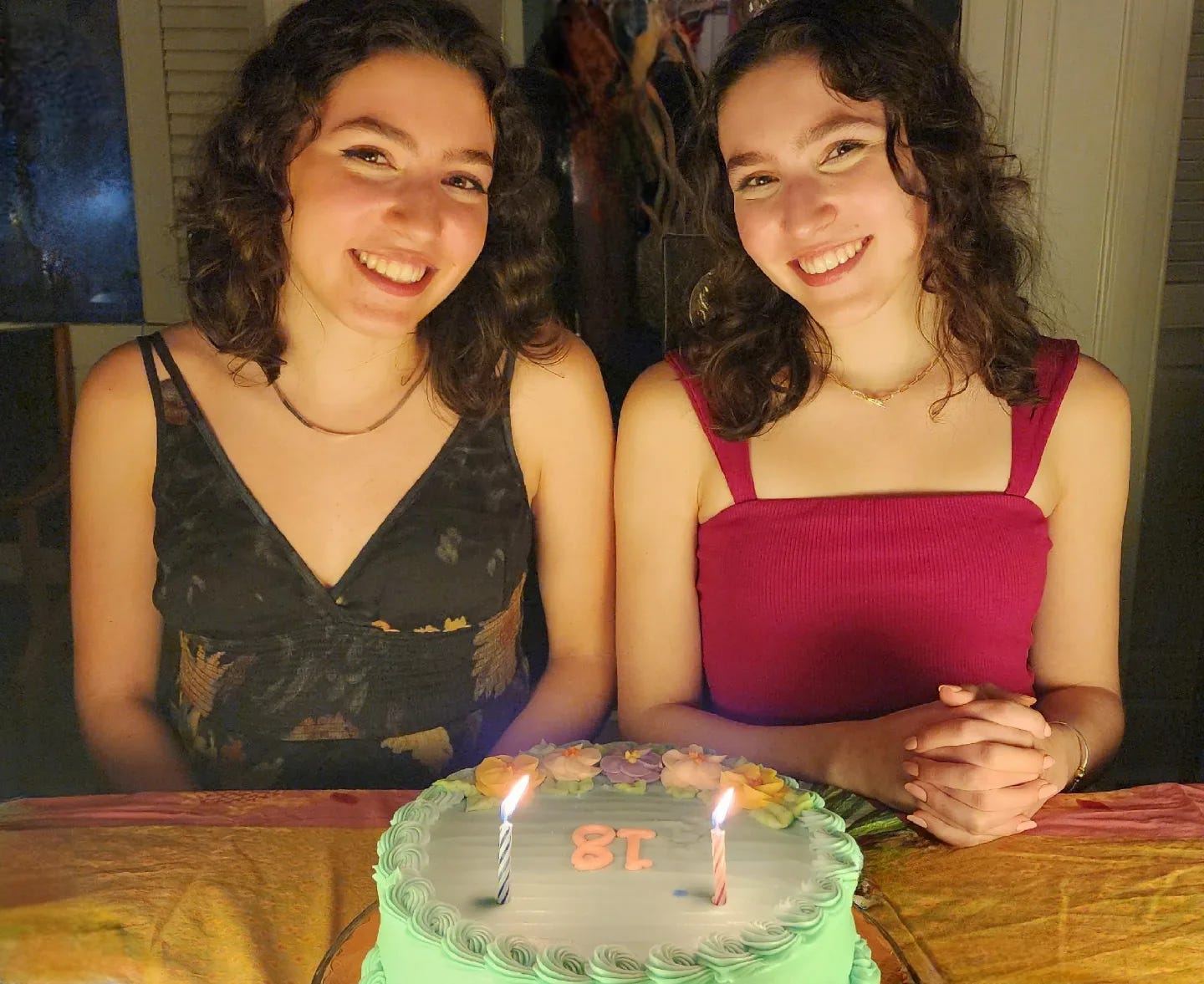The Meaning of 18: Lines Written on the Occasion of My Daughters' 18th Birthday
How 1 Number Has Come to Mean So Much
Thanks for reading The Nonlinear Life, a newsletter about navigating life's ups and downs. We explore family, health, work, and meaning, with the occasional dad joke and dose of inspiration. If you're new around here, learn about me, or check out our introductory post. And if you enjoyed this article, please subscribe or share with a friend.
War was raging in Ireland in the summer of 1798. The U.S. and France were locked in a diplomatic row. And a young poet named William Wordsworth made a return visit to the Wye Valley on the border between England and Wales.
There, on a walking tour with his sister, Wordsworth, already under the influence of Samuel Taylor Coleridge, wrote one of the most beautiful homages to the passage of time, reflecting on the “life of things” and the “living soul” of memories that dwell in “lovely forms” within each of our hearts.
Five years have past; five summers, with the length
Of five long winters! and again I hear
These waters, rolling from their mountain-springs
With a soft inland murmur.
The poem is called Lines Composed a Few Miles above Tintern Abbey, On Revisiting the Banks of the Wye during a Tour. July 13, 1798.
I found myself rereading this poem out loud last Saturday night at midnight as I listened to my daughters celebrate their “last birthday of childhood” with a group of friends singing “Dancing Queen.”
You are the dancing queen
Young and sweet
Only seventeen
Dancing queen
Having the time of their life.
Twenty years ago, on the eve of my wedding to Linda Rottenberg, my friend Ben gave a toast about how much I love numbers. He teased about the way I spoke about my experience Walking the Bible—“three continents, five countries, four war zones”—and how I articulated the awesome legacy of Abraham—“the father of 12 million Jews, two billion Christians, and one billion Muslims around the world.”
Two decades later, I guess I haven’t changed.
The numbers 4/15 are most often associated with bad things: paying taxes, the assassination of Abraham Lincoln, the sinking of the Titanic, the Boston Marathon bombing, the burning of Notre Dame. (PS: I was in France earlier this month and in what must be record time, Notre Dame, which lost its roof in 2019, is nearing restoration and is expected to open in 2024 in time for the Summer Olympics. Sagrada Familia, by contrast, took 150 years to complete!)
But for the 3 people I live with every day, the numbers 4 and 15 are the most magical of all, because they mark our family’s 1 numerological miracle: 20 fingers and 20 toes.
This year those 40 digits reached another milestone number.
18.
In Hebrew, every letter has a numerical value attached to it. Aleph is 1, bet is 2, gimel is 3, and so on. The Hebrew word for ‘life’ is ‘chai,’ which is comprised of chet, the number 8, and yud, the number 10. Together they total 18, which is why a signature prayer of blessings in Jewish liturgy is known as ‘the 18’ and why for generations Jews have celebrated life cycle events by giving gifts in multiples of 18.
(This Jewish symbolism of 18 played a forgotten role in one of the more iconic uses of numbers in 20th century entertainment. Joseph Heller’s satiric war novel Catch-22 was originally entitled Catch-18 because of the Hebrew connection with life. But Heller’s editor, the famed Robert Gottlieb, read the manuscript, besides cutting out 60 pages, he pressured Heller to change the title to avoid confusion with a recently published book by Leon Uris, the author of the blockbuster Exodus, entitled Mila 18. Here’s how The Atlantic recently characterized what happened next:
What followed was an exchange of frantic letters in which Heller and Gottlieb considered and rejected various numbers for the title. They decided 11 didn't work because of Ocean's 11; 14 was “an unfunny number;” and 26 just didn't feel right. “I've got it!” Gottlieb blurted out one night in a eureka moment. “It's Catch-22! It's funnier than 18.”)
Funny or not, last week, our 2 blessings, Tybee and Eden, reached their first multiple, with joy and gratitude, but also bittersweetness and trepidation. “We are adults now,” they say, while knowing that’s not quite true.
We feel that unstable axis, too, and our world tilting in a new direction. Even as we celebrate and shout ‘l’chaim loud enough to drown out our tears. So with reflections of Tintern Abbey reflecting in my ear, I offer this homage to the “steep and lofty cliffs” of time:
To a life well-lived.
To a life entirely in front of you.
And to a life of abundances too numerous to count.
☀
Thank you for reading The Nonlinear Life. Please help us grow the community by subscribing, sharing, and commenting below. If you'd like to do a storytelling project with a loved one similar to the one I did with my father, click here to learn more.
You might enjoy reading these posts:
The Myth of 10,000 Steps: Why Walks Are Good for You – But Not All Walks
What’s the Hardest Part of a Life Transition?
The Stories That Bind Us: My Most Popular Piece Ever
Or check out my books that inspired this newsletter: Life Is in the Transitions and The Secrets of Happy Families. Or my new book, The Search: Finding Meaningful Work in a Post-Career World.
Or, you can contact me directly.









